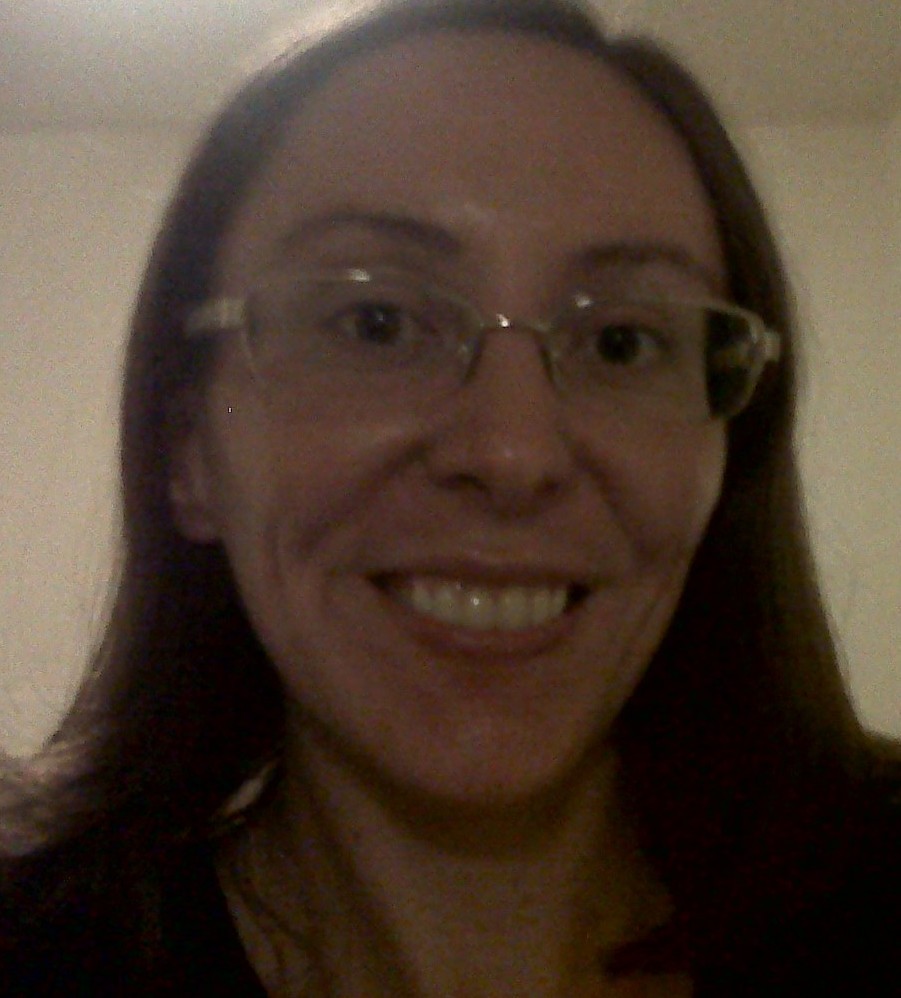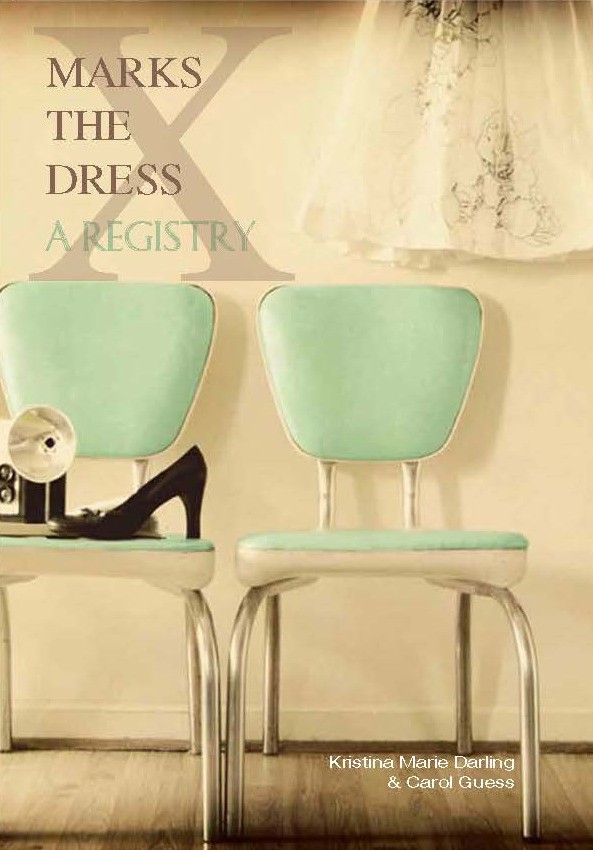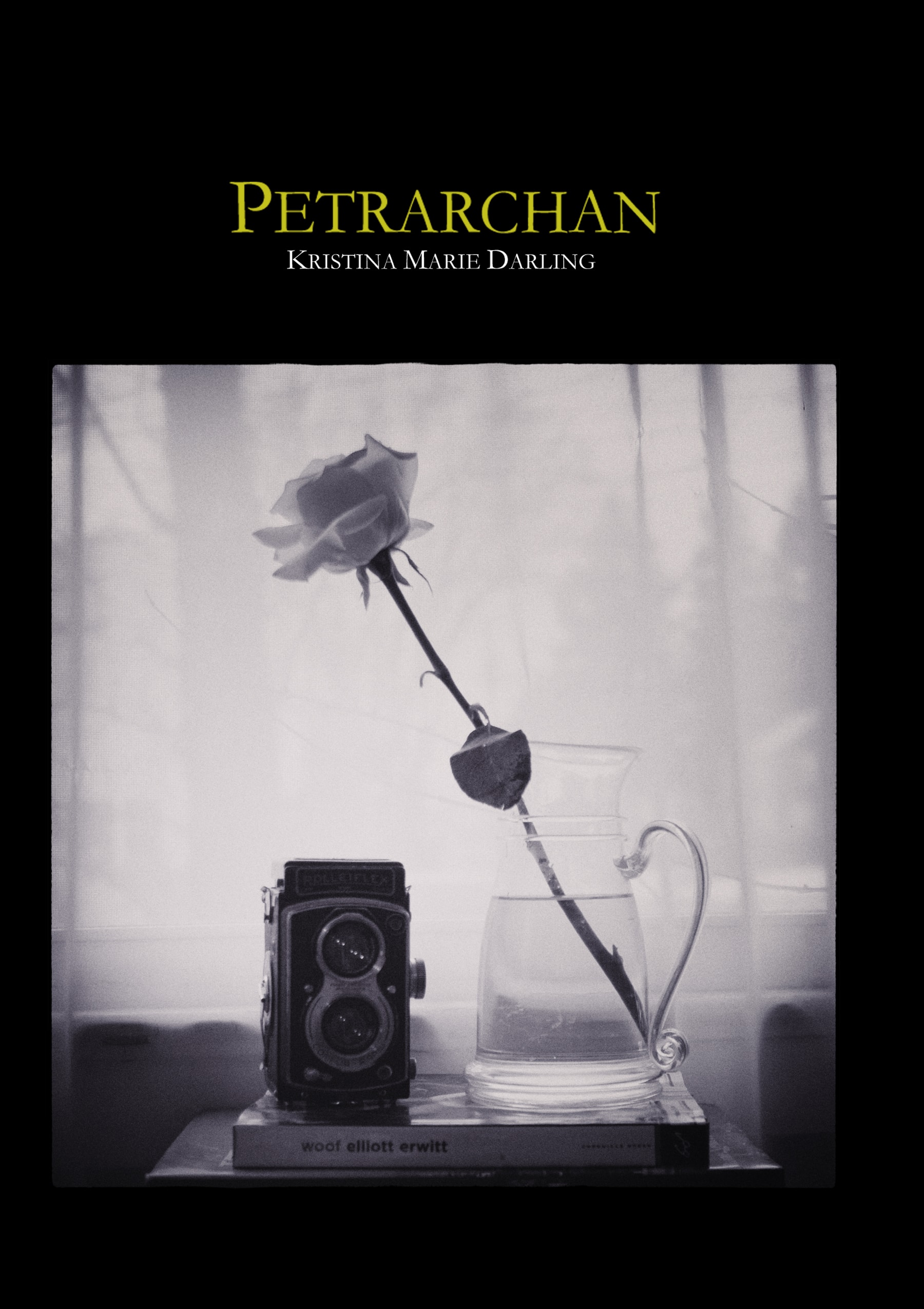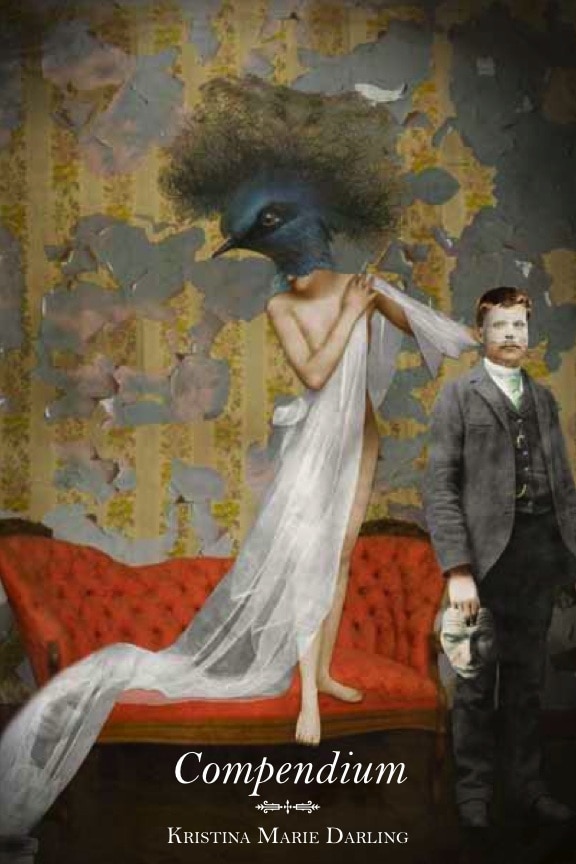Kristina Marie Darling
 Interview
Interview
by Carol Guess
Kristina Marie Darling is the author of twelve books, which include Melancholia (An Essay) (Ravenna Press, 2012), Petrarchan (BlazeVOX Books, 2013), and (with Carol Guess) X Marks the Dress: A Registry (Gold Wake Press, 2013). Her work has been honored with fellowships from Yaddo, the Hawthornden Castle International Retreat for Writers, the Helene Wurlitzer Foundation, and the Virginia Center for the Creative Arts, as well as grants from the Kittredge Fund and the Elizabeth George Foundation. Kristina is currently working toward a Ph.D. in Poetics at SUNY-Buffalo, where she holds a Presidential Fellowship. She edits Noctuary Press.
Carol Guess is the author of thirteen books of poetry and prose. She teaches at Western Washington University. Follow her here at: www.carolguess.blogspot.com.
 Carol Guess: How did you become interested in writing and publishing hybrid forms?
Carol Guess: How did you become interested in writing and publishing hybrid forms?
Kristina Marie Darling: I’ve was initially attracted to hybrid forms because they allow one to manipulate and undermine the reader’s expectations of narrative in interesting ways. When a reader sees prose on the page, they often assume that the text will unfold in a certain way: a linear narrative will appear, filled with clear explanations of what things mean. I’ve always loved working against these kinds of readerly expectations, creating texts that challenge our assumptions about what prose should be.
With that in mind, I think of hybrid writing as an attempt to question the limitations we place on literary texts as a result of their form, their genre, or their orientation on the printed page. Hybrid writing has a unique ability to expand what we as readers think is possible within a literary text, and to foster more open-minded reading practices.
I’m passionate about publishing hybrid writing by women because of the gender politics inherent in these assumptions about what’s possible in a literary text. So much of the time, socially dominant groups decide what counts as “fiction,” “poetry,” or even “narrative.” I’m very interested in documenting, and bringing visibility to, writing that challenges prevailing ideas about what’s possible (or not possible) within a literary text.
Carol: Your current academic research is focused on H.D. What’s the interplay between your academic work and your creative projects?
Kristina Marie: To some people, H.D. might seem like an unlikely choice for a writer interested in hybrid genre work. But I’ve always been fascinated by her use of the poetic image to lend unity to book-length projects. I feel I’ve learned a great deal from H.D. that I can apply to my own craft. In Helen in Egypt, for example, several recurring images recur throughout the book: seashells, the ocean, and a lyre. H.D. has shown me that a single image can be inscribed and reinscribed within a long poem, acquiring myriad possibilities for readerly interpretation as the book unfolds. The poetic image generates meaning, rather than being limited to a single fixed meaning. This technique is certainly something I’ve emulated in my own long poems, Petrarchan and Melancholia (An Essay).
Carol: What’s your writing process right now? How has it evolved? What role does geography play in your process?
Kristina Marie: When I first started writing, I never imagined how important residencies would become for my artistic process. These kinds of fellowships allow you to experience another part of the country or the world, which is always inspiring. There’s certainly something to be said for being taken out of one’s comfort zone (this is always a generative experience for me).
But perhaps more importantly, residencies allow you to encounter other artists’ work, and aesthetic choices that are often vastly different from one’s own. I’ve met several collaborators and life-long friends through these programs. I’m about to begin working again with a fashion designer, Max Avi Kaplan, who I met at the Vermont Studio Center. A few years back, we started a collaborative project, in which he’s craft beautiful objects and I’d write poems in response to them.
Over time I’d have to say that my writing practice has become increasingly collaborative, largely as a result of places like the Vermont Studio Center, Virginia Center for the Creative Arts, and Yaddo. I certainly welcome feedback, and even healthy challenges to my aesthetic choices, a lot more than I did before spending time in artists’ communities.
Carol: Your work often references fictional creations — films, theater, books that don’t exist. How do you distinguish between truth and fiction in your writing? What’s the role of history? And the imagination?
Kristina Marie: Tom Stoppard once said, “Truth is a work of the imagination.” And I think that, to a certain extent, he’s right. So much of what we think of as “truth” is wrapped up in artfully crafted (and often highly subjective) narratives. With that in mind, I don’t think that it’s necessarily important to distinguish between “truth” and “fiction” in my creative work. All narratives—whether literary, artistic, or personal—contain a certain degree of artifice. And what is history but narrative on a much grander scale, the imagination’s attempt to create continuity between disparate events?
Carol: You incorporate footnotes, lists, white space, erasures, and marginalia into your manuscripts. How did this style evolve? What is your relation to narrative?
Kristina Marie: I first started working with appropriated academic forms—like footnotes, glossaries, and appendices—when I was drafting my first book, Night Songs. I immediately wanted to return to marginalia as a literary form, mostly because it changes the relationship between artist and audience in really provocative ways. Rather than a reader passively accepting meaning from the writer, who explains in a rather straightforward fashion, works that incorporate marginalia often leave more room for the reader’s imagination. The reader is forced to assume a more active role, and he or she is asked to create meaning alongside the poet. What I love about marginalia is that it allows the work, and the various narratives proliferating within it, to become a collaboration between writer and reader. It is often the reader who actualizes the literary text through their imaginative work. Over the years, I’ve gravitated more toward these types of fragmented forms, and I’ve drifted away from
literary forms that foster a more passive reader. I’d have to say that my relationship to the reader
has become increasingly collaborative over the years.
Carol: Who are some of your major literary influences? Which contemporary authors are you currently reading?
Kristian Marie: I’ve been influenced a great deal by the Imagists. Even though I work in prose, I love the idea of a poetic image that carries within it an “intellectual and emotional complex,” which the reader must unravel. I’m also enamored by Alice Notley’s work. Her use of fragmentation and invented formal constraints is always an inspiration.
But lately, I’ve been reading a great deal of Allison Benis White’s poetry. She has two collections: Self Portrait With Crayon and Small Porcelain Head. The first won the Cleveland State University Poetry Center First Book Award, and the second won the Levis Prize. It may still be forthcoming. But both books are just magnificent. White’s prose poems raise compelling questions about femininity, ornamentation, and the nature of language. And they’re absolutely stunning.
Carol: Discuss the development of Noctuary Press. How did you go into publishing? What are your hopes for the press in the future?
Kristina Marie: Noctuary Press is a small publishing company funded by the generosity of the University at Buffalo Department of English. I started the press in the fall of 2012, but over year of planning had taken place beforehand.
The press focuses on women’s writing that takes place across (and beyond) traditional genre categories. The 2013 series features titles from Carol Guess, Eva Heisler, and Kristy Bowen. One thing that I’m especially proud of about the 2013 series is that it shows the range of styles, aesthetics, and formal approaches within cross-genre writing. We’ve already accepted erasures, book-length poems, and flash fictions in the guise of algebra word problems. I’m hoping to post an open call for submissions in the fall, and I look forward to being introduced to new voices. So stay tuned.
Carol: Your many books have been published by independent presses. What are the benefits of working with an indie press?
Kristina Marie: One of the great things about working with an independent press is that as an author, you have more freedom. Most of my friends who work with large commercial publishing houses have little or no input when it comes to things like design, cover art, typesetting, etc. But with an independent press, the author has a great deal more autonomy, and the freedom to actualize their vision for the book. This is one of the distinct advantages that I feel I can offer to writers who are interested in working with Noctuary Press.
Carol: What are your goals for your writing down the line?
Kristina Marie: I’d like to work on collaborations with other writers, but also with visual artists or musicians. I love being taken out of my comfort zone and exposed to new ideas, unfamiliar texts, and cultural ephemera that I otherwise wouldn’t have encountered.
Carol: What advice would you give to new writers? What advice do you wish someone had given you?
Kristina Marie: I had a teacher who gave me the worst advice I’ve ever heard about submitting poetry: “Start at the top. You can always work your way down the ladder if you get rejected.” I wish someone had told me that there’s nothing wrong with starting small. You can always build on a publication or credential once you have it. My first journal publication was in a magazine that was Xeroxed in somebody’s basement and stapled crooked. But after lots of hard work and research, I was able to get published in larger journals, like Cider Press Review and Gargoyle, and even The Gettysburg Review. I definitely learned this the hard way, but there’s no shame in starting small. And writers should never get discouraged by having to publish in an online journal before breaking into print, or volunteering for a magazine to learn the business, or publishing a small press chapbook, because you never know what the future has in store for you.
[printfriendly]

